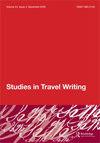殖民地的守护者:19世纪荷属东印度群岛的军事旅行者
Q2 Arts and Humanities
引用次数: 0
摘要
19世纪,许多人前往荷属东印度群岛服兵役。他们的任务是维持秩序和打击“叛乱分子”。荷兰士兵是占领军的一部分,负责控制人口。当时荷兰的权威还没有在印度尼西亚群岛的每个地方建立起来,他们有一项重要的任务。这次军事任务在多大程度上决定了他们的观点?本文主要关注三位士兵的文本:Maurits Ver Huell, Nikolaas Willem Schmal和Dirk Hendrik Kolff。他们三人都在19世纪早期访问过印度群岛,并各自出版了关于他们经历的游记。这篇文章说明了荷兰军事旅行者的任务如何影响了他们对土著人民的代表。它还讨论了他们的军事存在在多大程度上是一种暴力占领形式的问题。本文章由计算机程序翻译,如有差异,请以英文原文为准。
Guardians of the colony: nineteenth-century military travellers in the Dutch East Indies
ABSTRACT In the nineteenth century, many men left for the Dutch East Indies in military service. Their task was to maintain order and fight “rebels”. Dutch soldiers were part of the occupying force that saw to it that the population was kept under control. At a time when Dutch authority had not yet been established everywhere in the Indonesian archipelago, they had an important task. To what extent did this military mission determine their perspective? This article focuses on the texts of three soldiers: Maurits Ver Huell, Nikolaas Willem Schmal and Dirk Hendrik Kolff. All three visited the Indies in the early nineteenth century and each published a travelogue about their experiences. This article illustrates how the task that Dutch military travellers had influenced their representation of the indigenous people. It additionally addresses the question of the extent to which they represented their military presence as a form of violent occupation.
求助全文
通过发布文献求助,成功后即可免费获取论文全文。
去求助
来源期刊

Studies in Travel Writing
Arts and Humanities-Literature and Literary Theory
CiteScore
0.40
自引率
0.00%
发文量
13
期刊介绍:
Founded in 1997 by Tim Youngs, Studies in Travel Writing is an international, refereed journal dedicated to research on travel texts and to scholarly approaches to them. Unrestricted by period or region of study, the journal allows for specific contexts of travel writing to be established and for the application of a range of scholarly and critical approaches. It welcomes contributions from within, between or across academic disciplines; from senior scholars and from those at the start of their careers. It also publishes original interviews with travel writers, special themed issues, and book reviews.
 求助内容:
求助内容: 应助结果提醒方式:
应助结果提醒方式:


